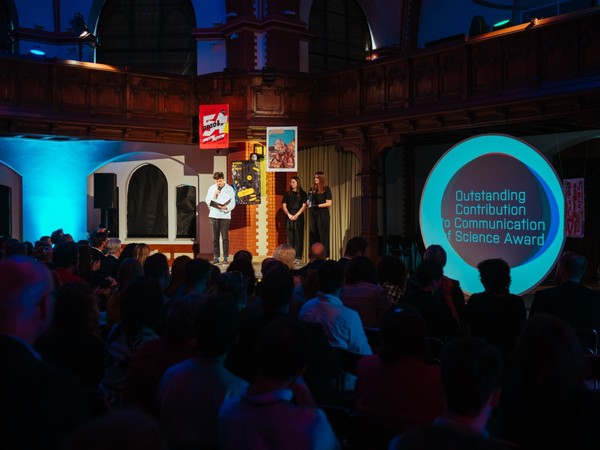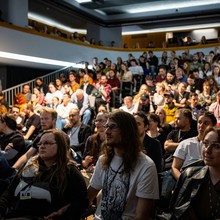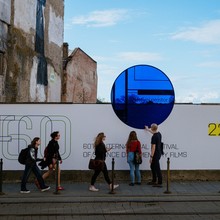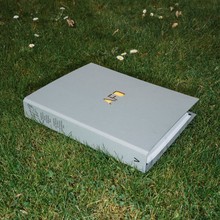This year’s edition of one of the biggest European festivals of popular science documentaries – Academia Film Olomouc (AFO) – has just wound up at Palacký University. Its 60th jubilee, with the theme Work in Progress, had 8,139 accredited visitors and 500 events to choose from.
Audiences had the unique opportunity to view films reflecting hot trends in global audiovisual production and those used as a medium for basic communication of scientific research. “AFO’s sixty years is proof that combining science, film, and human curiosity truly makes a lot of sense. The festival is the result of the shared passion of many generations and a massive amount of teamwork. We would like to thank everyone who has been and are a part of it,” summarised AFO director Eva Navrátilová.
And what is trending now in popular science?
The International Competition jury chose Turtle Walker as the Best International Science Documentary Film. This portrait of the Indian turtle researcher Satish Bhaskara is a fascinating study of scientific enthusiasm, curiosity, and discovery. “This was our European premiere, and the film had a wonderful reception. We spent years preparing the film. It’s a tender story, and we’re happy that it has inspired others, showing how a person can put their heart and hard work into something as a legacy to influence future generations. Today we desperately need such stories, because so much is going on and people can sometimes be overwhelmed by it all,” said Jill Ferguson, the film’s producer.
As part of the Science Communication Award, the jury also awarded Special Mention to The Forest by British director and producer Jamie E. Lochhead, which tells the story of the misinterpretation of the findings that our planet is capable of accommodating another trillion trees, highlighting the importance of proper communication of scientific data. First Prize for Science Communication went to the Canadian film Animal Pride, which deals with diverse forms of love in nature.
The Czech & Slovak Competition offered a wide range of diverse topics
The jury awarded four prizes. The prize for the Best Czech & Slovak film went to Zuzana Piussi’s documentary The Scent Trail. The film presents a disturbing flaw in the Czech justice system and stands as an excellent example of a thorough investigative documentary approach. Lapilli stands out as a formal opposite. This Slovak experimental film constitutes a visual poem and a form of therapy for director Paula Ďurinová. The film received Honourable Mention. The Best Science Communication Award went to David Čálek for Doctor on a Trip. “Science documentary films are not mainly what I do, this was kind of an exception. But when I saw the films in the competition, I thought that this film belonged here, because it’s about psychological well-being and treating depression, combining Western medicine with the shamanic traditions of the Amazon. Thank you for this award, I really appreciate it,” the director said.
Short Film Competition
The Best Short Film Award in the Short Film Competition went to Wetlands – Life Blood. The film presents the audience with the genius loci of wetlands and organisms that live there. The short film Testerep received Honourable Mention. It uses modern technology to reconstruct historical landscapes that no longer exist.
New at AFO this year was the Immersive Competition
Honourable Mention went to the project Wilfred Buck’s Star Stories. The programme screened at the Fort Science planetarium tells the story of an astronomer and folklorist Wilfred Buck navigating the night sky. The Best Immersive Work Award went to the augmented reality project Turbulence: Jamais Vu. It simulates an inner ear disorder and disrupts the viewers’ senses to represent what it is like to live with such a condition. The Best First or Second Science Documentary Award, another new category, went to the film Burkitt.
“Philosopher Mark Fisher has written that ‘real wealth is the collective capacity to produce, care, and enjoy’. Since its inception, AFO as a film festival has also been about that. The importance of science itself and of science documentaries lies in the fact that they carefully examine reality and attempt to discover the facts in it, whatever they may be,” Ondřej Kazík, programme director of the festival, pointed out. He also added that this year’s festival, among other things, offered an exhibition of a new subgenre of documentaries as well as reflections on its own history.
And what did the audiences vote for?
The Audience Award went to Sběratelé kratomu (The Kratom Collectors). This Czech medium-length documentary examines the phenomenon of a substance, which is a medicine for some and a recreational drug for others. “AFO is something I’ve always admired – the combination of science and art. This is what influenced my decision to study multimedia production at Silesian University in Opava. This festival sets the bar for all of us. I’m overjoyed by this award,” said Libor Cinegr, director of The Kratom Collectors, expressing his enthusiasm. The film had its world premiere in Olomouc.
This year, the company Sandbox Films again awarded the best projects of participants in the Camp4Science programme. Honourable Mention and a prize of 10,000 USD went to the projects Yet the Faces and Snow Globe. First Prize and an award of 25,000 USD went to the project The Archipelago – a powerful coming of age story. “I love AFO, this is my fifth time here. It’s a place which is all about the audiences and the filmmakers, which makes it unique. It’s obvious that people come here because they are interested, they want to talk about things. Popular science is something that really matters to them, and they want to try new things,” said Jessica Harrop, co-founder of Sandbox Films and a mentor at Camp4Science.
The Student Jury Award was given to the emotionally-charged, character-driven documentary Light Darkness Light in which blind priest Ian Nichols undergoes a bionic eye implant in order to see again.
Academia Film Olomouc – AFO is a festival aimed at documentary films which are about science, social themes, scientists, scientific findings, ethics connected to pushing the boundaries of human knowledge, and approaches to education. The aim of the festival is also to show that film, television, and other audiovisual work continues to be the most effective medium to popularise science.



